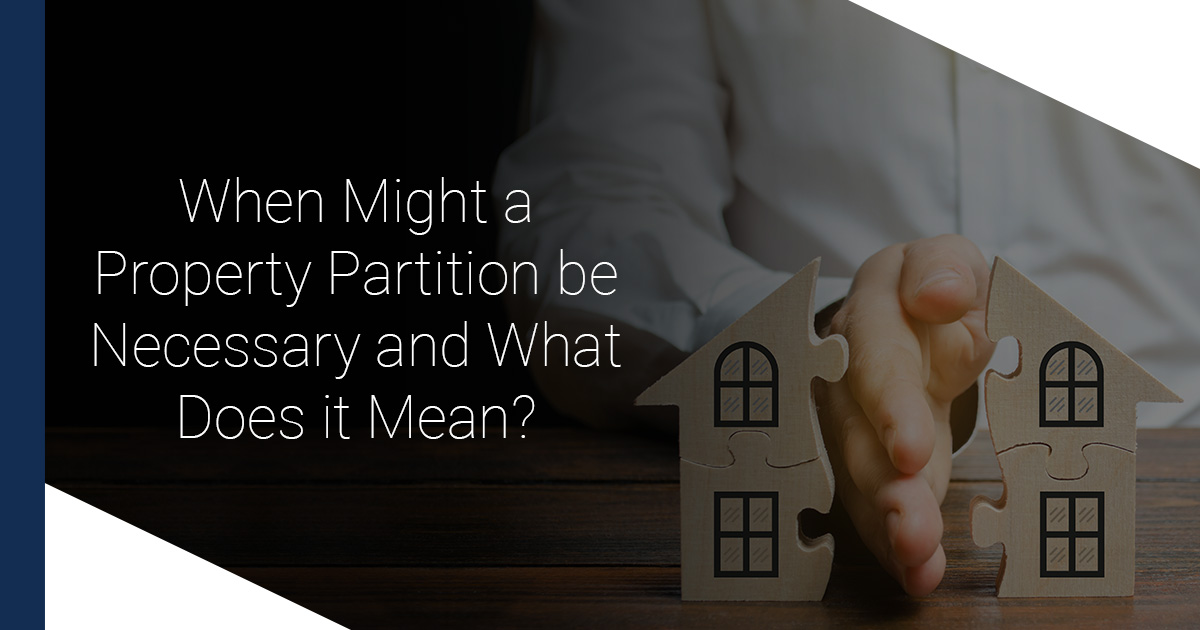When real property is co-owned by two or more people, each owner has a legal ownership interest in the property. It also means that all owners must agree on how the property is used and maintained or a dispute may arise. When a dispute does occur, partition may be the only solution. Understanding what is involved in Georgia’s partition actions is essential if you foresee that jointly held property is headed for partition.
When Might Partition Be Necessary?
People may co-own property under a wide variety of circumstances; however, common examples include unmarried romantic partners, business partners, a parent and an adult child, or siblings that inherited property. Co-ownership means that each owner has equal rights and responsibilities regarding the property. Legally speaking, it also means that each owner has the right to decide how the property is used and when the property is sold; however, that becomes a problem if a disagreement occurs between the co-owners regarding how to use the property. Common situations where the partition of property may be necessary include:
- Dissolution of a business partnership. Business partners often purchase real property in the course of operating the business. If the partnership dissolves, the partners are left as co-owners of the property and may not be able to agree on what to do with the property.
- Inherited property. Real property is frequently passed down to siblings, making them co-owners of the property. One sibling may want to live on the property while another wants to sell the property. If they cannot reach a mutually agreeable compromise, partition may be the only option.
- Romantic breakup. When a married couple decides to end the marriage, any real property owned by the couple becomes part of the division of assets in the ensuing divorce. If unmarried romantic partners purchase real estate, however, and subsequently end the relationship, there is no legal process that addresses the status of the property. Consequently, a partition may be needed if the co-owners cannot agree on how to handle the property.
What Does It Mean to Partition Property?
The goal of a partition action is to take a jointly owned property and separate the legal interest of the co-owners into individual interests. In the State of Georgia, there are two ways to partition property, including:
- Statutory partition. Statutory partition can be thought of as the default method of partition in Georgia and is used more frequently than equitable partition. This method of partitioning property involves petitioning the Superior Court in the county where the land is situated. A statutory partition may result in a physical division of the property with each owner gaining sole ownership of a share of the divided property. Sometimes, the physical division of the property is not practical. For example, when a property has a home on it that cannot physically be divided in two, the physical partition is not practical. In that case, a statutory partition can be achieved by one party buying out the remaining party (or parties) interest in the property or by the sale of the property and division of the profits among the co-owners.
- Equitable partition. Equitable partition is only used when “the remedy at law is insufficient or peculiar circumstances render the proceeding in equity more suitable and just.” Georgia courts construe the statutes and laws pertaining to partition strictly and will likely deny a request for an equitable partition if a statutory partition is possible. In an equitable partition, the court will physically divide the property or order the sale of the property and distribution of the proceeds among the co-owners.
The primary difference between a statutory and an equitable partition, from a legal perspective, is that a statutory partition uses the existing statute as the basis for partition, whereas the right to an equitable partition is founded on existing case law and precedent. Although the legal steps involved in an equitable partition may appear simpler, Georgia law requires the parties to follow the procedures for a statutory partition unless a statutory partition is impractical or impossible.
Speak to an Experienced Georgia Partition Action Attorney Today
A partition action can be legally complex and emotionally charged given that there is typically an existing relationship between the parties. To ensure that your interests are protected in a partition action, contact an experienced Georgia partition actions attorney to discuss how we can help you by calling 678-882-0830.


